Yves here. It’s funny how if you’ve had no particular reason to examine key junctures of history to overlook how key decisions set events moving down a particular road. It’s hard to recognize the path dependence unless you were a close observer of the original actions or you have them unpacked later. For instance, one major and critical set of decisions took place at the Council of Vienna in 1815, when national boundaries were redrawn after the Napoleonic conquests and reversal. These negotiations often determined which of various royal claimants wound up in charge of particular jurisdictions. The proof that that was well done is the nearly 100 years of peace, save some minor dustups. As we can see, the much less complex negotiations between the West and the USSR, with Gorbachev, was not conducted with such long-term concerns. The durability of peace in a soon-to-be unipolar world was assumed.
By John Helmer who has been the longest continuously serving foreign correspondent in Russia, and the only western journalist to have directed his own bureau independent of single national or commercial ties. Helmer has also been a professor of political science, and advisor to government heads in Greece, the United States, and Asia. Originally published at Dances with Bears
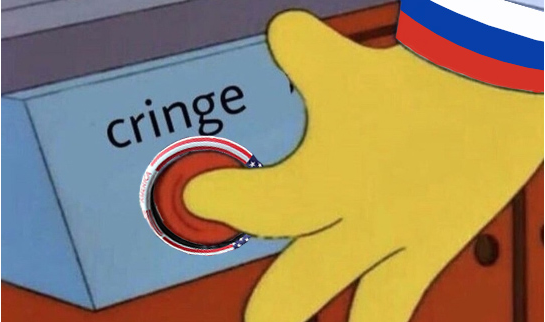
In the rest of the world it is known as the cultural cringe. In Russia the wish to be loved by Americans is known as liberal reform.
In the very first paragraph of a new book called “Collapse: the Fall of the Soviet Union”, the author, Vladislav Zubok – the name in Russian means a small tooth — reveals that on the morning of August 19, 1991, when the first coup was attempted against Mikhail Gorbachev, then President of the Soviet Union, Zubok was flying to the US by arrangement with Strobe Talbott, Moscow correspondent for Time and soon to be the Clinton Administration’s principal Russia expert. At the time Zubok describes himself as a “Moscow-based academic intellectual”. By this, he means he was no simple worker with a Moscow university degree. In Soviet class terms, he insists the reader recognise him to be an “intellectual”. That then was upper class, and Zubok wants the reader to know the difference between the Russian upper and lower classes — immediately, on the nineteenth line of his very first page.
Zubok also wants the reader to know he had been hired with money from “the prestigious Amherst College in Massachusetts”. What exactly was prestigious about Amherst, or Massachusetts for that matter — and to whom? And why does Zubok think that in a history of Russian politics between 1983 and 1991, such a remote place, with such an adjectival tag, was worth the mention?
The answer, like the other revelations of the first paragraph, reveals what this book turns out to be. It’s an exercise in American-style reconstruction of what a small group of Russians for hire were keen to give their masters, about the circumstances of the years leading up to Boris Yeltsin’s replacement of Mikhail Gorbachev, and Russia of the Soviet Union. But this isn’t Russian history. It’s the history of Russians with cultural cringe – the desire to be loved by Americans, and to tell them what they wanted, paid for, insisted on hearing then, and demand now.
The payoff, reported on the dust jacket of the book, comes from Talbott, Zubok’s original employer. He is quoted as saying: “This is a deeply researched indictment of Mikhail Gorbachev’s timidity and mercurial policies which backfired.” “Instead,” Talbott adds, “Russia at the turn of the 21st century was ripe for the rise of Putin.” Zubok was ripe for what Talbott meant. “In 2008,” according to Zubok’s history, Putin “used military force against Georgia, and in 2014 he annexed Crimea and waged an undeclared war on Ukraine in Donbass.” The blame for that, Zubok means, was Gorbachev’s mistakes. Without them, “had the Kremlin ruler made different choices… the Soviet Union could have gradually made its way into the world economy by a process of trial and error, with a nomenklatura-style state capitalism, and certainly with its institutions of power preserved.”
As for the Russian cultural cringe, Zubok is sure it was one of Gorbachev’s biggest mistakes. During his well-known trips abroad in the 1980s, Gorbachev took with him, Zubok records, “a “huge entourage…of journalists, social scientists, writers, theatre directors, filmmakers and other cultural figures. Most of them shared [Gorbachev’s] fascination, admiration, and envy for things Western.”
Zubok has written a book to prove he doesn’t suffer this cringe. The work proves the opposite. This is the problem with cringers. They are too bent out of shape to recognize the shape they are in.
In the present situation, now that Russia is at war with the US and NATO, there is one crucial question which Zubok’s history ought to be able to answer. It is this: why in 1990, as the condition for German reunification in the negotiations of that year, did Gorbachev agree to withdrawing the Soviet army from east Germany and not insist the US and NATO do the same from west Germany, ensuring the neutrality of the new German state outside NATO?
Finnlandisierung was the German word for it then; finlandizatsia, финляндизация, in Russian; Finlandization in English. The word does not appear in Zubok’s history. Nor neutralitätserklärung — the policy adopted by Austria from 1955, keeping that part of the German-Austrian union (Anschluss) of 1938 out of the European military pacts. Austria is not mentioned by Zubok.
This question, and its answer, have been lost in the debate over NATO’s expansion since the escalation of US and NATO operations in the Ukraine from 2014.The question of mutual and reciprocal troop withdrawals, Soviet and US, Warsaw Pact and NATO alliance, and the effective neutrality of Germany, is even more pressing today, after German Chancellor Olaf Scholz has committed €100 billion to rebuilding a blitzkrieg-capable German army for the first time since German expansion into Austria, followed by Sudetenland in Czechoslovakia, and then the Polish Corridor which started World War II.
Researching what Gorbachev said, did, and intended on the issue of German neutrality, Zubok tells the story that at their summit meeting in Washington on May 31, 1990, “when [President George H.W.] Bush asked him about Germany and NATO, Gorbachev suddenly acknowledged that…Germany should be given the right to choose any alliance it wanted to join. Bush and other Americans could not believe their ears…Gorbachev was giving away something very significant without bargaining or even consulting his advisors…Marshal [Sergei] Akhromeyev and Valentin Falin, a key Soviet expert on on Germany, gesticulated and whispered in evident horror.”
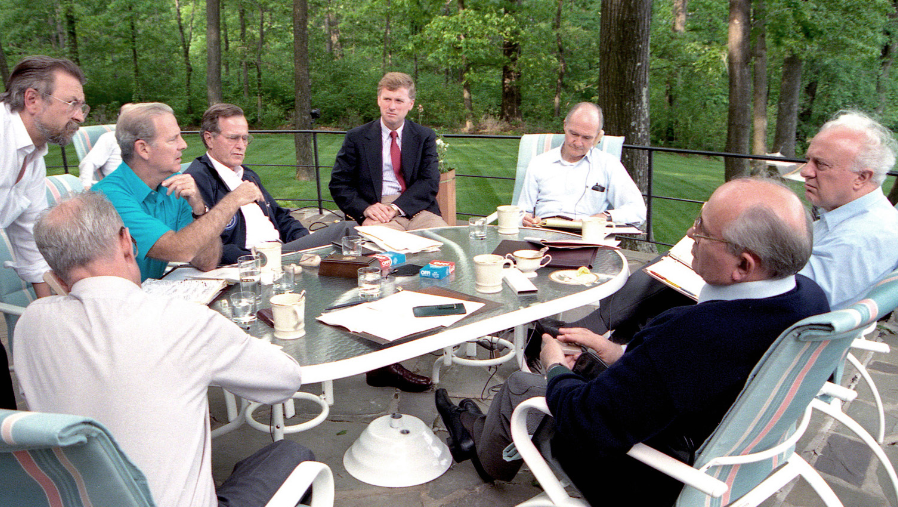
At Camp David, June 2, 1990: left to right: interpreter Peter Afanasenko, Secretary of State James Baker, President George Bush, Vice President Dan Quayle, National Security Adviser Lieut-General Brent Scowcroft, Foreign Minister Eduard Shevardnadze, President Mikhail Gorbachev and Marshal Sergei Akhromeyev, military adviser to Gorbachev (back to camera), June 2, 1990: About Akhromeyev, read this.
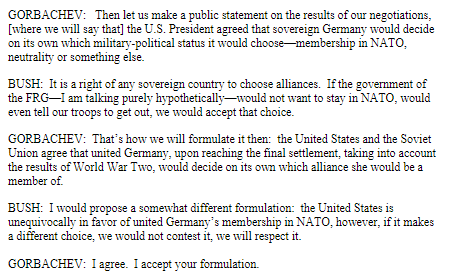
Transcript of conversation, White House, May 31, 1990.
Zubok identifies no Russian source for his report. He castigates Akhromeyev’s suicide the following year with the allegation that he was a “probable executioner” of a plot to assassinate both Gorbachev and Yeltsin. That, according to Zubok, came from Fritz Ermarth, then a senior CIA official whose hearsay version came to Zubok from Talbott. Zubok never mentions Falin again.
He then reveals not only what explained Gorbachev’s unilateral giveaway, but also Zubok’s sole source – Anatoly Chernayev, then Gorbachev’s principal foreign advisor. Chernayev “was not surprised. Gorbachev, he reflected, was sacrificing diplomacy, but not to keep himself in power – instead, in the name of his vision. The Kremlin leader wanted the United States and its allies to help the USSR become ‘stronger but democratic…progressive, dynamic, free, and turned towards the outside world and the US.’”
Chernayev was Zubok’s most quoted source on Gorbachev. Zubok acknowledges “I was very influenced by my meetings and conversations with him… In 1995 Chernayev introduced me to Gorbachev; a few years later, Chernayev shared with me his remartkable diaries, still unpublished at the time.” Zubok does not report asking Chernayev himself the German question while he was still alive; he died in 2017, leaving his diaries to George Washington University in Washington, DC. Gorbachev, who remains alive, was not asked the German question by Zubok.
Chernayev is also Zubok’s source for his account of Gorbachev’s unilateral decision to side with the US against Saddam Hussein during the Kuwait crisis of August 1990, just weeks after Gorbachev had decided to side with the US on the German question. But first Zubok discredits Saddam Hussein, the Iraqi leader at the time, as a “megalomaniac”. He also discredits the principal Soviet expert on the Middle East at the time, Yevgeny Primakov. “an ambitious expert” and also “from Georgia and [Foreign Minister Eduard Shevardnadze’s] rival. (Zubok appears not to know that Primakov was ethnically Jewish and never interested in Georgian politics.)
But from Chernayev on Gorbachev’s motivation during the Kuwait decision-making, Zubok got the reality. Gorbachev believed his personal political survival in the Kremlin depended on raising money for a Soviet economic bailout and favour for himself over Yeltsin’s challenge, from the US. He therefore concluded, in Chernayev’s interpretation, that he would do whatever the Americans wanted, or demanded. In order to get away with that, he ignored everyone in the Soviet government, starting with the Red Army and the Soviet Defense Ministry and the intelligence assessments represented by Falin on Germany, Iraq by Primakov. “We must put America before the Arabs. This is our future and our salvation” – Zubok quotes Chernayev as saying. By “our future” and “our salvation” Chernayev meant Gorbachev’s personal future.
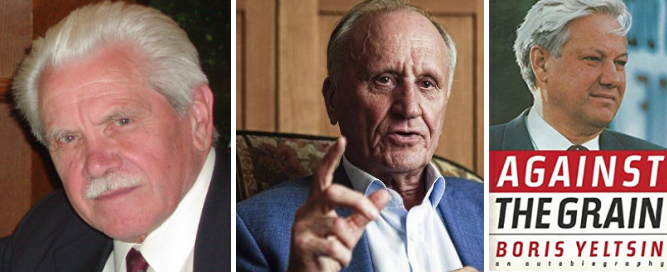
Zubok’s sources of truth, left to right: Anatoly Chernayev, d. March 12, 2017; Gennady Burbulis, d. June 19, 2022; Boris Yeltsin’s autobiography, published on March 1, 1990, by Jonathan Cape in London and Simon & Schuster in New York,. Cape was owned at the time by Random House, the New York publisher which was controlled in turn by the Newhouse family.
On Yeltsin’s rivalry with Gorbachev, his schemes and intentions, Zubok relies on another single source – Gennady Burbulis. Zubok interviewed him (by telephone) five times; he interviewed no one else as often. On Burbulis’s say-so about himself, Zubok concludes that he “assumed a particularly prominent role next to Yeltsin”. Zubok did not check this with Alexander Rutskoy, who became Yeltsin’s vice president, and later one of the leaders of the parliamentary challenge to Yeltsin in 1993. Instead, Zubok diminishes Rutskoy with an innuendo of corruption – his “nationalist views now matched his interests in the RSFR oil business”. Zubok’s source for that was kompromat placed in a Moscow newspaper. For his history, Zubok characterized no other member of Yeltsin’s entourage or his government by his alleged business interests.
Zubok is silent on the money that was paid to Yeltsin for his US and European trips and for his autobiography of March 1990, Against the Grain, which Zubok cites as credible evidence as often as Burbulis. The book was reportedly contracted in June 1989 by a London agent named Andrew Nurnberg; translated into English by Michael Glenny; and published by the New York company, Simon & Schuster. Where the money came from for the book in 1989, how much was paid to Yeltsin, and whether, as Yeltsin claims to have promised, proceeds from the book sales were sent to a Soviet AIDS fund, was investigated with Nurnberg at his London office, and with Misha Glenny, son of the translator who died in Moscow shortly after the book appeared. Nurnberg was asked how the book project was first introduced to him; how many of the books were printed; how many sold; how much money was paid to Yeltsin and how much to the AIDS charity. He refuses to answer. Nurnberg’s website also reports that for Yeltsin as one of its client authors, “there are currently no items!”
Glenny also did not answer for what his father had known about the source of the project.
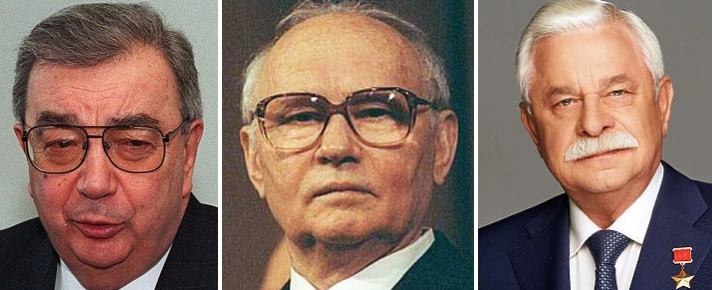
Zubok’s sources of disinformation, left to right: the “ambitious Georgian”, Yevgeny Primakov; Vladimir Kryuchkov, KGB chief from 1988, whom Zubok calls “this baby-faced man”; Vice President Alexander Rutskoy.
On February 18, 2022, the week before the Russian military operation commenced in the Ukraine, Zubok gave an interview to the Moscow newspaper Komsomolskaya Pravda, explaining why he has now concluded the Soviet Union had collapsed and fallen, as the title of the book claims. “For a long time, I believed that the reason was only the unresolved nature of some Russian political and economic problems. But in the archives of the administration of US President George W. Bush, I found an interesting recording of a meeting at the White House about possible financial assistance from the West to Gorbachev. Treasury Secretary Nicholas Brady spoke, and he spoke clearly and unequivocally: ‘The strategic task of the United States is to see Russia as a third-rate country that will not have a powerful military-industrial complex capable of providing full-scale military operations.’”
In the book Zubok referred to Brady several times, and he quoted several of his remarks in opposition to a financial aid package Gorbachev was asking Bush to provide in 1990. In the book Zubok interpreted Brady as having several different reasons for his position. But Brady’s intention to destroy Russia as a military power is missing from the book – and so is the warfighting meaning which Brady articulated. Why did Zubok suppress it?
This personal endorsement of Brady’s policy by Zubok appears in Komsomolskaya Pravda. “The United States pragmatically and prudently did not want to see Russia as a great power either in the form of the USSR or in the form of an independent federation.”
That Gorbachev failed to understand what was “pragmatic and prudent” in US policy was understood by the Russians whom Zubok has denigrated in his account. That he too accepts what was “practical and prudent” he left out of the book, leaving Chernayev and Burbulis as his sources to fault Gorbachev for following Russian history in the wrong direction.
Gorbachev’s mistake, Zubok concludes, was that his “role model was Vladimir Lenin, the great destroyer of Russian statehood”. As Zubok doesn’t pretend to know much about the history of Russia before or after the Bolshevik Revolution of 1917, the claim about Lenin – repeated several times over in the book – is Zubok’s cringe. He has nothing else to show for it.
To that he adds an irony. “In a major paradox of Soviet history, Gorbachev consistently rejected the methods and features that were at the core of Lenin’s success. He preferred speeches to action, parliamentary consensus to violence, and devolution of power to dictatorship”. Zubok doesn’t mean to say that Gorbachev lacked Lenin’s theory of imperialism and his suspicion of the Anglo-American and European powers which Gorbachev wanted to trust, to cultivate. He does mean to say that Gorbachev lacked Lenin’s understanding of force in politics, and so proved “feckless when the political and economic storm came.”
Exactly what then should Gorbachev have done, according to Zubok’s interpretation? The answer is that he should have done what he had chosen to do in foreign policy – follow the US direction, do what the American leaders, intelligence agents, economists, bankers, and corporate executives told him to do. “Gorbachev was capable of acting resolutely in foreign policy on the German Question and in the Middle East. Had he acted in the same way domestically, the future of the Soviet Union could have taken a different turn.”
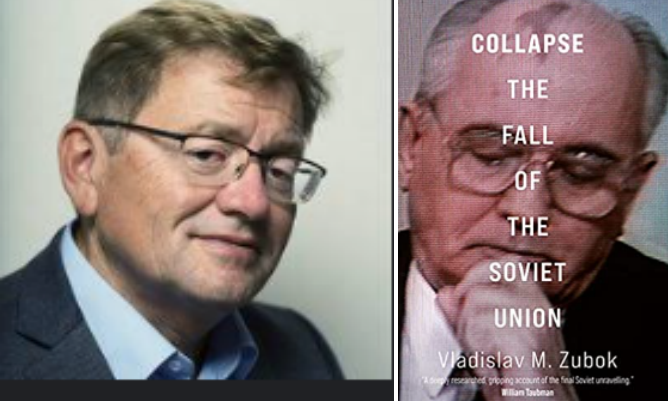
Left: Vladislav Zubok. Right, his book, to be published in paperback in September this year, has been endorsed by William Taubman, the US historian Gorbachev authorized to compose his biography; reviewed here. Zubok’s book has also just been authorized by the Pushkin House Book Prize committee of selection.
This is such a bizarre contradiction can Zubok’s cringe have disabled his capacity to see it?
Who cannot see that the way in which Russia is currently acting on the current version of the German Question and the Middle East is diametrically opposed to what the US requires the Kremlin leadership to to follow — German neutrality then, Ukrainian neutrality now; Iraq then, Syria and Libya today. Zubok is sure the “pragmatic and prudent” thing for Putin and the Russian Army to do right now is what the US, the NATO alliance, and the Ukrainian regime in Kiev require.
Zubok’s history concludes on a metaphor of seagoing meteorology. The Soviet Union, he claims, “fell victim to a perfect storm and a hapless captain”. But now that the ship of the Russian state is at war with the US and NATO over what Russians believe to be a fundamental threat to their survival, Zubok’s conviction is that Russians should abandon ship and swim with the US tide. This, his book shows, is exactly what Gorbachev, Chernayev, Burbulis, and Yeltsin all believed. It’s also what every US official from the Bush to the Biden administrations believes they can count on the Russians to do if enough force is employed to threaten them.
This is a conclusion which the careful contrivance of evidence and non-evidence in the history is something to cringe about, though not if you are Russian in these days. Perhaps if you are a historian employed in London to display this cringe in public as if it’s the lesson of the past, and also the guide to the future.


On Lenin as the destroyer of Russian statehood, Helmer may not have his finger on the pulse of actual Russian thought. At least on the right side of Russian politics, this is pretty standard fair. The idea that Lenin and the first generation of Soviet leaders did dismember Russia to the benefit of the periphery, creating a great many republics where there were none before is common. Perhaps a reaction formed by Russian nationalism more than anything else, but there’s some validity. Ukraine, for example, was created out of whole cloth by Lenin and all of a sudden there were millions of Ukrainians at a time when the homeland of ethnic Ukrainians wasn’t soviet at all.
There never was a communist party of the Russian federation, unlike every major region and republic. There were many ethnic Russians in the state of course, but no Russian party. Given the power that the Ukrainian communist party gained after Stalin’s death, there’s a strong argument that domestic politics in the USSR revolves around the regional party structure (especially how politicians gained power). Whether this was an intentional structure to deprive the Russian part of the USSR is a more complex question that I’m not sure anyone answer, but a lot of Russians see it that way.
Well, in 1917 the Germans did send Lenin back to Russia in a sealed train to sow chaos, and succeeded beyond their wildest dreams. Then again it’s the same German regime that allowed restoration of republican government in France after defeating it in 1870, Bismarck believing against all evidence that it would weaken the country compared to a monarchy or emperor.
> it’s the same German regime that allowed restoration of republican government in France
Well, the advocates of republican government were, were they not, whacking the Communards. So there would have been that to say for them.
Thank you, Yves.
Further to relations between Germany and Russia, https://twitter.com/MMQWalker/status/1539115931540103168?cxt=HHwWgIC9-Z_yhNwqAAAA is typical of the PMC and its camp followers.
Gorbachev is widely despised and considered an idiot by his countrymen. The real mystery is why Andropov, a highly hard-nosed KGB chief if there was any, thought so highly of him.
It may well be that Andropov didn’t plan for Gorbachev to take over so soon.
Instead Andropov meant to oversee while Gorbachev and others handled the day to day issues of reforming the soviet economy.
But his health problems removed him from the scene far too early.
I’ve recently read sections of another book by Zubok (written with Constantine Pleshakov) from 1996, Inside the Kremlin’s Cold War: From Stalin to Khrushchev. Whatever they found in the archives, it is steadily interpreted through coarse understandings of Stalin’s personality and “Marxism-Leninism.” This means that close attention to the path dependencies that Yves mentions, tracing complex, highly-charged interactions between state players during 1945-48 and how they congealed into the Cold War, is traded for simplistic, fateful determinism based on putative rigidities in Soviet thought. A couple of examples:
1. The authors discuss the cautious optimism held by the Soviets in 1944-5, based on the willingness of Roosevelt and Churchill to recognize a Soviet sphere of influence to address their security concerns. But then “it was the atomic bombardment of Japan and the abrupt end of the war in the Pacific that convinced Stalin that his dream of a postwar partnership was not to be fulfilled. The old demons of insecurity were back. The atomic bomb threw the Kremlin leader off balance – and eventually back into the curse of tyrants: neurotic solitude.” (p 40) No mention is made of Truman’s pugnacity at Potsdam after learning of the successful test at Alamogordo and subsequent indications that the US would use the bomb. Instead we have a neurotic imbalance.
2. The Soviets for some time assumed that there will eventually be a resumption of competition between capitalist states and the possibility of armed conflict between them. Such an understanding might conceivably be based on the fact that there had just been two world wars between capitalist states over a thirty year period. But the authors instead see dogma at work: “…Stalin, a true Leninist, looked at his former partners in struggle with Hitler as a shaky coalition of two imperialist powers, with conflicting priorities in many parts of the world, particularly in the Middle East and Southeast Asia.” (p. 46) With such a jaded view, how could peace have a chance?
The early chapters are riddled with this stuff. It’s a poor substitute for carefully tracking, for example, Soviet decisions on how to manage the occupation of Eastern Europe in light of changes in the US approach to German unification. Overall, the book is governed by an agnostic attitude towards US policy drivers, leaving the authors free to concoct a kind of “Soviet mindset” that drove policy, very much in the tradition of Kennan’s windup toy model.
Yeah, again and again the early days of the post-WW2 period is seen through the haze of MAD. Back then there was little regard for the long term effects of a nuclear war. To the leaders at the time, it was simply a bigger bomb. One that allowed them to do more damage with less planes and thus aircrews. Only over time did it dawn on the world that nukes may well “salt” the earth around their detonation.
Also, i seem to recall that Stalin already knew about the results of the testing come Potsdam. Never mind that said “abrupt end” to the pacific war may well have as much, if not more, with USSR engaging in a land war with Japan in Manchuria, as with the nuking of Japanese cities. After all, Japan had suffered ongoing bombing, both area and fire, of its cities for some time already.
But a land war with USSR, given both the history between them and the dwindling resources of Japan, would mean that the red army would likely be poised for a crossing from Korea to Japan itself in short order. And unlike USA, would likely not have any qualms throwing itself against the bamboo spears of the locals.
I guess some segment of Russian intelligentsia suffers from a inferiority complex. First in favor of French thinking, and since WW2 US thinking (that far too often ends up being badly translated and misunderstood French thinking anyways).
I listened to the audiobook of Collapse and really enjoyed its gripping political account (it is pretty insidery). I’m not any kind of expert or particularly knowledgeable about Russia or the Soviet Union, nor do I know much about Zubok other than this book — but I don’t really get the criticism here, I didn’t interpret Zubok’s book in this way at all.
Zubok’s thesis here is that the USSR need not have splintered the way it did in 1991, but Gorbachev was a sort of world-historical buffoon how made this possible.
Zubok maintains Gorbachev should have focused on reform of the Soviet economy and raising living standards but instead Gorbachev showed little interest in economics and chose to focus on political reform and opening up to the West.
In pursuing political reform Gorbachev did nothing but unleash the forces of nationalism – above all Russian nationalism – and allow a strong opposition to materialize and the same time as he was giving away his own political powers thereby making reform harder to achieve. I don’t see his book as saying Gorbachev’s failure was in not aping the US enough.
Agreed. This all seems pretty hand wavy from Helmer. The substance of the book is that Gorbachev’s inept management of domestic political and economic issues left the USSR with an extremely weak hand on the international stage. Time and time again Gorbachev shoots himself in the foot in ways that are confirmed in the historical record rather than dependent on the subjective interpretation of one or another of Zubok’s sources, and then comes to negotiations with the US or a soon to be former Soviet state in a dismal position. And even in those situations we see Gorbachev incapable of playing the hand he has, which Zubok portrays very critically, suggesting that the approach should have been more confrontational and self-interested (not that it would have mattered given how things were going back home).
I know JH’s commentary is appreciated around here (including often by myself) but I thoroughly enjoyed the book and this lengthy portrayal of it sells it quite short. I have Zubok’s Stalin -> Kruschev book ready to go next and am looking forward to it.
This is interesting history/knowledge either way, but I have to say in all seriousness, let’s say that this guy and his sponsors had gotten what he claims they wanted (neutral Germany)- We just watched as first Finland and then Lithuania blatantly broke binding treaties to poke their fingers into the eyes of the Russians. What would make anyone assume that a “neutral” Germany would not be doing exactly the same thing while under the exact same pressures/corrupting influence from the US/UK that Finland and Lithuania are subjected to?
Maybe my memory is flawed, but my recall about pundit assessment of the re-unification of East Germany with West Germany at the time it happened was that East Germany would be an economically backward millstone or anchor likely to drown the German state; there were people who felt it would be a downer and not an asset to the German state. Perspectives change!
After the 1937 purges, the Communist Party of the Soviet Union was highly Russian dominated and the minority nationalities played a much smaller role. If I read Yuri Slezkin correctly, he sees the alienation of the Jewish elites that this caused as one of the factors undermining the long-term legitimacy of the Soviet Union.
As to why Andropov thought so highly of Gorbachev, some factors were that Gorbachev was a true believer in a generation of pure careerists and that he was excellent at doing politics within the Soviet system as it existed. That would leave Gorbachev unprepared for the challenges of drastically changing that system, but possibly in ways that Andropov could not have foreseen because Andropov shared the same elite Soviet mindset.
I thoroughly enjoyed listening to the Zubok book, but as he portrays the importance and the guiltlessness of the American role in the end days of the Soviet Union, I reminded myself over and over that Zubok wrote this book as part of a US think tank, in other words as a spokesperson for the US nomenklatura.
I noted that Zubok portrayed Gorbachev as an economic fool and as utterly out of ideas by the end of his time in office and Yeltsin as the daring pro-American reformer, but also showed that the moment Yeltsin got his hands on the steering wheel, he was suddenly as clueless as Gorbachev. This suggests that the problems really were insuperable.
I have to quibble I don’t feel like Zubok portrayed Yeltsin as a “daring pro-American reformer” — yes he shows that Yeltsin was quite taken with American society and wanted to model Russia after the United States, but I don’t think Zubok protrays Yeltsin as being some kind of effective or great reformer or leader, the portrayal is more that he was indeed more daring and politically effective compare to Gorbachev’s blundering and arrogance.